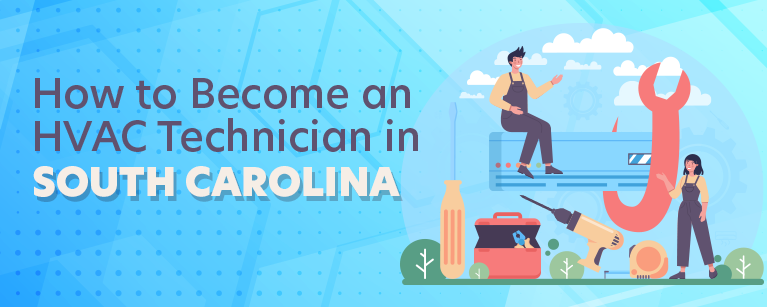
With nearly 2.5 million housing units and 450,000 small businesses in South Carolina, the HVAC industry is booming with potential.
After all, every home and business in the state will need an HVAC system installed, maintained, repaired, or serviced at some point – and since most property owners don’t have the necessary training or skills to do it themselves, HVAC technicians are called upon to save the day.
Table of Contents
How to Become an HVAC Technician in South Carolina: A Step-by-Step Guide
Becoming an HVAC technician in South Carolina is much easier said than done – especially if you plan on becoming a licensed HVAC contractor – but that doesn’t mean it’s impossible, and the benefits often outweigh the drawbacks.
There are three primary ways to get started as an HVAC technician in SC:
- Gain an entry-level position working under a licensed contractor
- Enroll in an accredited college-level HVAC course
- Enroll in an apprenticeship with an accredited HVAC program
Anyone who aspires to be a licensed contractor will have to complete an apprenticeship, but technicians aren’t required to hold a license – so long as the contractor they work for is licensed by the state.
If you plan on pursuing a career in the HVAC industry, follow the step-by-step guide below!
Complete Your Education
First things first – all HVAC technicians and apprentices are required to have a high school diploma or GED to install, service, and/or repair HVAC equipment.
With that said, technicians aren’t expected to complete any formal education beyond secondary school, and a college degree isn’t necessary.
Of course, those interested in honing their skills and easing their way into the HVAC industry can enroll in an accredited course at a nearby college or trade school.
These courses generally take 1-2 years and provide the individual with all the tools, knowledge, and experience needed to succeed in the industry.
Obtain EPA Certification
In 1970, President Richard Nixon passed the Clean Air Act to ‘protect public health and welfare from different types of air pollution caused by a diverse array of pollution sources,’ according to the EPA (Environmental Protection Agency).
The act has seen its fair share of amendments through the years.
In 1990, Congress passed Section 608 of the Clean Air Act.
This amendment requires all technicians and contractors who maintain, service, repair or dispose of air-conditioning or refrigeration equipment to pass an exam and obtain an EPA 608 certification before working in the field – which is federal law.
There are four primary types of EPA 608 certifications – Type I (small appliances with less than 5 pounds of refrigerant), Type II (high-pressure systems with more than 5 pounds of refrigerant), Type III (low-pressure systems), and Universal (which combines Type I, Type II, and Type III into one certification.
Complete an Apprenticeship
An apprenticeship allows aspiring HVAC technicians to work under and learn from a licensed HVAC contractor – often combining in-classroom learning with real-world, hands-on experience.
Most apprenticeship programs last 4-5 years and help prepare an individual for obtaining their license.
One of the most popular apprenticeship programs in South Carolina is UA Local 421 – a five-year program that includes both on-the-job training and classroom education.
Aspiring technicians will be able to learn the trade from a talented professional while receiving a livable wage with the possibility of raises.
Obtain State-Issued License
To upgrade from an HVAC technician to an HVAC contractor in South Carolina, you must first obtain a state-issued license.
There are two primary types of licenses issued by the state – mechanical contractor and residential specialty HVAC contractor. Let’s take a closer look at the differences:
- Mechanical Contractor – must pass two exams (technical exam and Business Management and Law exam) to perform commercial construction worth more than $5,000.
- Residential Specialty HVAC Contractor – must pass two exams ((technical exam and Business Management and Law exam) to perform residential installations and repairs that exceed $200.
Both licenses are issued by the South Carolina Department of Labor, Licensing and Regulation – the Contractor’s Licensing Board oversees the Mechanical Contractor license, while the Residential Builders Commission oversees the Residential Specialty HVAC Contractor license.
Exams cost $75 to $150 each.
Obtain Additional Certifications & Licenses
In addition to the state-issued licenses listed above (which are required by HVAC contractors in South Carolina), aspiring HVAC technicians and contractors should consider additional training and certifications through the Municipal Association of South Carolina – which aren’t required, but are recommended.
There are three primary certifications one can earn through the MASC – let’s take a closer look:
- Residential HVAC Certification – allows HVAC technicians to work exclusively on residential equipment.
- HVAC Journeyman Unlimited Certification – allows HVAC technicians to work on units of all sizes, but only if they have two years of experience and work under the supervision of a master/contractor.
- Master Mechanical (HARV) HVAC Certification – allows HVAC technicians (with four years of experience as a journeyman) to work on units of all sizes without supervision.
Not only that, but technicians can earn certifications through the North American Technical Excellence (NATE), the American Society of Heating, Refrigeration and Air-Conditioning Engineers (ASHRAE), the Refrigeration Service Engineers Society (RSES), and the Building Performance Institute (BPI).
HVAC Schools in South Carolina
One of the best ways to get ahead in the HVAC industry is by attending an accredited school, program, or apprenticeship – learning the trade from a licensed and experienced HVAC professional.
The good news is aspiring HVAC technicians have a wide range of options to consider in the South Carolina community.
The two primary organizations responsible for accrediting HVAC schools in the US are HVAC Excellence and the Partnership for Air-Conditioning, Heating, Refrigeration Accreditation (PAHRA).
There aren’t any PAHRA-accredited schools in South Carolina, but there are two HVAC-Excellence-accredited schools.
Central Carolina Technical College
Location: 506 N Guignard Dr, Sumter, SC 29150
Program: HVAC/R
Accredited By: HVAC Excellence; Southern Association of Colleges and Schools Commission on Colleges
Course Length: 39 semester hours (basic certificate), 25 semester hours (advanced certificate)
Tuition Cost: $194 to $227 per credit hour (in-state) or $331 per credit hour (out-of-state)
Located just 40 miles east of Columbia, SC, 100 miles west of Myrtle Beach, SC, and 100 miles north of Charleston, SC, the Central Carolina Technical College offers a Basic Air Conditioning and Heating Certificate (BACH) and an Advanced Air Conditioning and Heating Certificate (AACH) – for those who graduate the basic course.
Greenville Technical College
Location: 506 S Pleasantburg Dr, Greenville, SC 29607
Program: HVAC/R
Accredited By: HVAC Excellence; Southern Association of Colleges and Schools Commission on Colleges
Course Length: 3 semesters (diploma and HVAC/R certification) or one semester (basic electricity refrigeration certificate)
Tuition Cost: $277 per credit hour (in-county), $294 per credit hour (out-of-county), or $470 per credit hour (out-of-state)
Located just 100 miles northwest of Columbia, SC, 100 miles northeast of Athens, GA, and 100 miles southwest of Charlotte, NC, the Greenville Technical College is one of two colleges in South Carolina with an HVAC Excellence-accredited program.
The program takes three semesters (1.5 years) to complete.
Midlands Technical College
Location: Columbia, SC
Program: HVAC/R
Accredited By: Southern Association of Colleges and Schools Commission on Colleges
Course Length: 3 semesters (certificate and diploma) or five semesters (AAS degree)
Tuition Cost: $6,230 (certificate), $8,010 (diploma), or $12,638 (degree)
With a number of campuses splattered across Columbia, SC, the Midlands Technical College offers a variety of options for those interested in the HVAC industry – including a certificate, a diploma, and an associate degree.
It’s not accredited by HVAC Excellence or PAHRA, but it’s a well-respected program.
Spartanburg Community College
Location: 107 Community College Drive, Spartanburg, SC 29303
Program: HVAC
Accredited By: Commission on Colleges of the Southern Association of Colleges and Schools
Course Length: 42 weeks (certificate) or 74 weeks (AAS degree)
Tuition Cost: $198 per credit hour (Spartanburg and Cherokee County residents), $226 per credit hour (Union County residents), $245 per credit hour (out-of-county residents), and $403 per credit hour (out-of-state residents)
Located just 30 minutes east of Greenville, SC, 75 miles west of Charlotte, NC, and 100 miles northwest of Columbia, SC, the Spartanburg Community College offers a 42-week (39 credits) HVAC/R technology certification and a 74-week (67 credits) associate degree in General Technology.
| School Name | Address |
|---|---|
| Central Carolina Technical College | 506 N Guignard Dr, Sumter, SC 29150, United States |
| Greenville Technical College | 506 S Pleasantburg Dr, Greenville, SC 29607, United States |
| Midlands Technical College | 151 Powell Rd, Columbia, SC 29203, United States |
| Spartanburg Community College | 107 Community College Drive, Spartanburg, SC 29303, United States |
HVAC Technician Salary in South Carolina
The average salary for an HVAC technician in the United States is $49,321 (between $42,615 and $58,114) – unfortunately for residents in South Carolina, that average salary dips to $46,565 (between $40,233 and $54,866).
Don’t worry; several factors affect an HVAC technician’s salary – so don’t let the lower average discourage you from entering the industry.
Annual Salary Range:| Location | Avg. Annual Salary |
|---|---|
| Columbia | $45,434 |
| Charleston | $46,561 |
| North Charleston | $46,561 |
| Mount Pleasant | $46,561 |
| Rock HIll | $48,261 |
| Greenville | $46,329 |
| Summerville | $46,329 |
| Goose Creek | $46,493 |
| Sumter | $43,843 |
| Hilton Head Islanc | $45,774 |
Regional Salary in South Carolina
| Region | Employed | Avg. Annual Salary | Avg. Hourly Pay | Top 10% Annual Salary | Bottom 10% Annual Salary |
|---|---|---|---|---|---|
| Charleston-North Charleston, SC | 1,100 | $55,370 | $26.62 | $74,150 | $38,250 |
| Columbia, SC | 1,100 | $52,060 | $25.03 | $67,330 | $36,170 |
| Florence, SC | 150 | $51,390 | $24.71 | $68,530 | $37,150 |
| Greenville-Anderson-Mauldin, SC | 1,020 | $53,320 | $25.63 | $73,580 | $37,060 |
| Hilton Head Island-Bluffton-Beaufort, SC | 380 | $52,310 | $25.15 | $67,070 | $35,150 |
| Myrtle Beach-Conway-North Myrtle Beach, SC-NC | 710 | $48,980 | $23.55 | $60,810 | $35,640 |
| Spartanburg, SC | 470 | $53,190 | $25.57 | $64,450 | $37,390 |
| Sumter, SC | 120 | $47,080 | $22.63 | $60,210 | $35,360 |
* Employment conditions in your area may vary.
Frequently Asked Questions
Can I use my South Carolina HVAC license in any other state in the US?
Those with a Mechanical Contractor License can work reciprocally in Alabama, Georgia, Louisiana, Mississippi, North Carolina, Ohio, Tennessee, Texas, and Utah.
How long does it take to become a licensed HVAC contractor in South Carolina?
It takes roughly 1-2 years to go through school and another 3-5 years to go through an apprenticeship.
How often do I need to renew my South Carolina HVAC license?
The Residential Specialty Contractor license must be renewed every two years for $160, while the Commercial Mechanical Contractor license must be renewed every two years for $350.
Do I need a state license if I have the HARV Master Mechanical certification?
No, the HARV certification acts as a waiver for the state licensing exam.
HVAC Technician Info by State
- Alabama
- Alaska
- Arizona
- Arkansas
- California
- Colorado
- Connecticut
- Delaware
- Florida
- Georgia
- Hawaii
- Idaho
- Illinois
- Indiana
- Iowa
- Kansas
- Kentucky
- Louisiana
- Maine
- Maryland
- Massachusetts
- Michigan
- Minnesota
- Mississippi
- Missouri
- Montana
- Nebraska
- Nevada
- New Hampshire
- New Jersey
- New Mexico
- New York
- North Carolina
- North Dakota
- Ohio
- Oklahoma
- Oregon
- Pennsylvania
- Rhode Island
- South Carolina
- South Dakota
- Tennessee
- Texas
- Utah
- Vermont
- Virginia
- Washington
- West Virginia
- Wisconsin
- Wyoming









